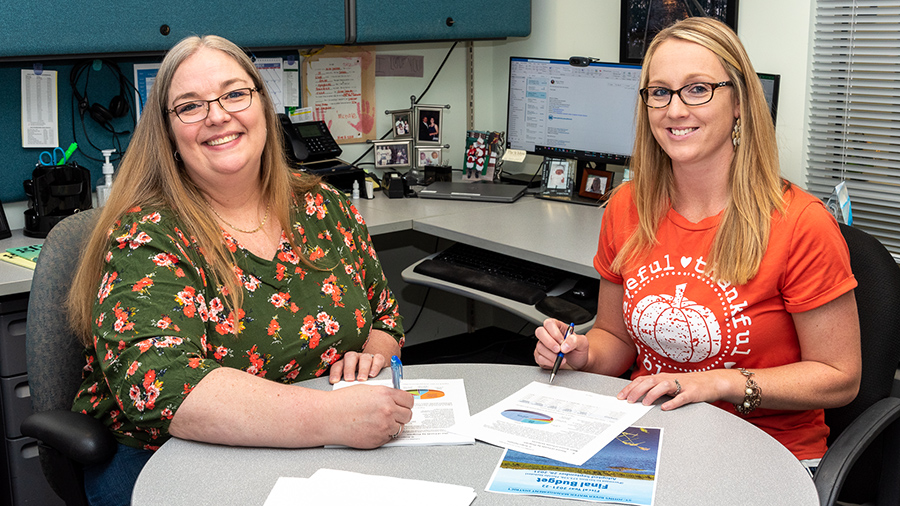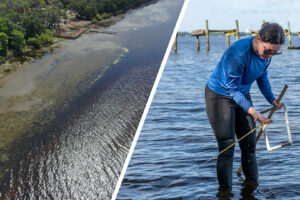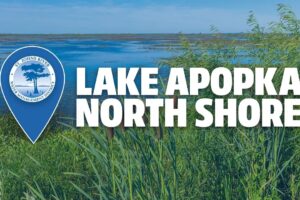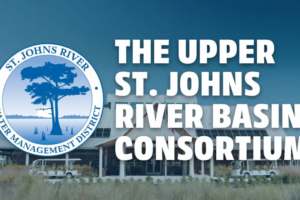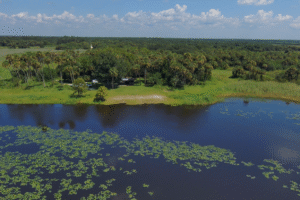District budget funds multifaceted work, impacts many across our region
Jan. 27, 2022
District Budget Director Missy Licourt and Budget Coordinator Heather Barber work together to finalize the latest draft of the District’s budget.
Guest column: Missy Licourt, Budget Director, Office of Financial Services
As the Budget Director for the St. Johns River Water Management District, I get to interact with all the work groups and leadership of the District to help produce an annual budget that helps us do the day-to-day work to protect Florida’s water resources. It’s exciting to see the projects behind all those numbers in a ledger.
We are currently operating under the fiscal year 2021–2022 budget, which took effect Oct. 1, 2021. This $296.7 million budget will provide significant funding to meet our statutorily required and core missions work, while keeping property taxes low. The current property tax rate means the owner of a $200,000 house with a $50,000 homestead exemption would pay $32.84 in property taxes to the District.
If you’ve ever wondered what you get for the taxes you pay to the District, I’d say our work is all around. As an environmental regulatory agency of the state of Florida, our work is focused on improving water quality, protecting our springs and water resources, and ensuring a resilient water supply to support healthy aquatic ecosystems and economic growth across our 18 counties in northeast and east-central Florida.
You might see our work in your community in many ways.
- One way many people know us is through the public lands we purchased to protect water resources. These lands are open for the public to enjoy for free. Among our 42 properties, you’ll find 59 primitive campsites, 424 miles of trails, 35 boat and canoe launches, 14 observation platforms and 38 picnic areas.
- Another is through our water quality improvement and restoration projects, such as at Lake Apopka. Through our District-led and partners’ work, we are seeing water quality improvement that has allowed native aquatic plants to recolonize the lake and provide critical sport fish habitat. The recovering bass populations are attracting recent fishing tournaments. The Lake Apopka North Shore is also among our most popular properties, with its free wildlife drive where visitors can see the recovering wetlands and all their associated wildlife.
- Our education program is another way the public interacts with the District. Staff work with teachers and students to foster stewardship of natural resources and our Blue School Grant Program has helped to fund 75 water projects in middle and high schools, including the current school year.
- Other ways you’ll see our work is through our cost-share programs where we are helping local governments with stormwater and water supply projects; when our Regulatory staff inspect newly developed stormwater ponds that collect, store and treat stormwater runoff to ensure they function as designed; or through the rainfall, surface water, groundwater and the other 16 million pieces of hydrologic data our team members monitor and collect each year to guide restoration projects and activities.
Budgeting is a year-round process. Earlier this month, the District submitted its fiscal year 2022–2023 preliminary budget to the state for review, following approval by our Governing Board. We’re looking forward to the opportunities and new work we’ll undertake next fiscal year while carrying out the current projects to help preserve the water resources that make Florida special.


